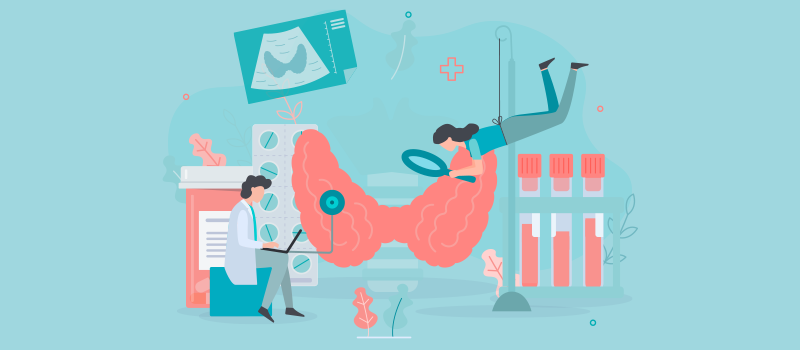What’s the Buzz
The Bee Healthy Blog
What is Thyrotoxicosis and How Is It Treated?

Thyrotoxicosis is a relatively rare but serious condition in which there is too much thyroid hormone in the body. According to the American Thyroid Association, both men and women can get thyrotoxicosis, but women are more commonly affected. Please continue reading to learn more about what causes thyrotoxicosis and how it is treated.
What are the thyroid gland and thyroid hormones?
The thyroid gland is a small, butterfly-shaped gland in the front of the neck. Normal thyroid tissue makes two hormones—triiodothyronine (T3) and thyroxine (T4)—which are called thyroid hormones. Thyroid function is controlled by a hormone called thyroid-stimulating hormone (TSH), which is secreted by the pituitary gland in the brain.
In healthy people, the thyroid gland regulates many processes in the body, including metabolism, body temperature, and heart rate. When the thyroid gland produces too little or too much thyroid hormone, it results in thyroid disorders. Low levels of thyroid hormones are called hypothyroidism or underactive thyroid. High levels of thyroid hormones are called hyperthyroidism or overactive thyroid.
Other types of thyroid disease can also occur due to iodine deficiency or autoimmune thyroid disease, which is an immune system disorder in which thyroid antibodies mistakenly attack healthy thyroid tissue. Thyroid cancer is a condition in which there is an uncontrolled growth of thyroid cells.
What’s the difference between thyrotoxicosis and hyperthyroidism (overactive thyroid) disease?
As mentioned above, thyrotoxicosis is the presence of too much thyroid hormone in the body. Hyperthyroidism (overactive thyroid gland) is a type of thyrotoxicosis. Specifically, hyperthyroidism refers to a condition in which the excess thyroid hormone is due to increased thyroid hormone synthesis by the thyroid gland.
On the other hand, thyrotoxicosis refers to the presence of too much thyroid hormone in the body regardless of the cause. Therefore, when taking too much thyroid replacement medication results in too much thyroid hormone, it is called thyrotoxicosis (and not hyperthyroidism).
How serious is thyrotoxicosis?
Thyrotoxicosis can vary greatly in severity. The excess thyroid hormone in people with thyrotoxicosis can result in a clinical presentation that ranges from no symptoms to a life-threatening thyroid storm. A thyroid storm or thyroid crisis is a severe case of thyrotoxicosis. It is rare but can be life-threatening and requires immediate medical attention.
It is important to undergo proper diagnosis and management for thyrotoxicosis. Your doctors can identify the cause of thyroid dysfunction and treat it appropriately. Untreated hyperthyroidism and thyrotoxicosis can result in serious complications, including altered mental status, delirium, muscle weakness, osteoporosis, thyroid eye disease, atrial fibrillation, thromboembolic disease, congestive heart failure, cardiovascular collapse, and even death.
Who is at risk of developing thyrotoxicosis?
Anyone can develop symptoms of thyrotoxicosis, but some people are at higher risk. Risk factors for thyrotoxicosis include:
- Female gender.
- Age above 60 years.
- A family history of thyroid disease, specifically Graves’ disease.
- Certain autoimmune conditions, such as Addison’s disease, type 1 diabetes, and pernicious anemia.
- Recent childbirth.
What are the causes of thyrotoxicosis?
Some of the causes of thyrotoxicosis are listed below.
- Graves disease and other causes of hyperthyroidism, such as toxic multinodular goiter (Plummer’s disease).
- Thyroiditis (thyroid inflammation), including postpartum thyroiditis (following childbirth).
- Taking excess thyroid replacement medication for hypothyroidism or underactive thyroid gland.
- Eating contaminated beef that contains cow thyroid tissue (this is called hamburger thyroiditis and is very rare).
What is a symptom of thyrotoxicosis?
Thyroid hormones regulate metabolism. People with thyrotoxicosis are in a hypermetabolic state due to an excess of thyroid hormones. Symptoms of thyrotoxicosis can therefore include:
- Unexplained weight loss.
- Arrhythmias (irregular heartbeat or palpitations).
- Tachycardia (rapid heartbeat).
- Muscle weakness.
- Shakiness, nervousness, anxiety, or irritability.
- Increased heat sensitivity.
- Changes in menstrual cycle.
Symptoms of severe thyrotoxicosis (thyroid storm) may include:
- High fever.
- Rapid heartbeat.
- Agitation and confusion.
- Diarrhea.
- Loss of consciousness
- High blood pressure
- Arrhythmias.
Is there a cure for thyrotoxicosis?
Healthcare providers can cure thyrotoxicosis depending on the underlying cause. Diagnosis of thyrotoxicosis is made based on the results of blood tests that measure the levels of thyroid hormones (T3, T4, and thyroid stimulating hormone TSH). Other diagnostic tests include radioactive iodine uptake, thyroid uptake scan, and other imaging studies.
In general, the outlook for people with thyrotoxicosis is good. There are several effective treatments available for thyrotoxicosis, including antithyroid drugs.
How do doctors treat thyrotoxicosis?
The treatment for thyrotoxicosis depends on the cause. For example, sometimes Graves hyperthyroidism is the cause of too much thyroid hormone and thyrotoxicosis. In such cases, patients with Graves disease will need treatment of Graves disease.
Possible treatment options for thyrotoxicosis include:
- Anti-thyroid medication for hyperthyroidism, such as methimazole (Tapazole) and propylthiouracil (PTU). Anti-thyroid drugs work by preventing the thyroid gland from making thyroid hormones.
- Radioactive iodine therapy damages the cells of the thyroid gland and shrinks it in size, causing thyroid hormone levels to fall. However, the destruction of the thyroid tissue is permanent and ultimately leads to hypothyroidism. This needs to be treated with lifelong thyroid hormone therapy to maintain hormone levels.
- Surgical treatment (thyroidectomy or thyroid gland removal) can be done to correct hyperthyroidism. Again, this causes hypothyroidism and requires lifelong thyroid hormone replacement.
- Beta-blockers are medications that do not change thyroid hormone levels. However, they block some of the effects. Beta-blockers may be prescribed to control symptoms like shakiness and rapid heartbeat caused by thyrotoxicosis due to temporary causes like thyroiditis.
- Steroid medicines for thyroid inflammation can help to control symptoms like pain.
How long do symptoms of thyrotoxicosis last?
The symptoms of thyrotoxicosis last depending on the underlying cause and treatment. For instance, in patients with Graves disease, thyrotoxicosis symptoms will last until they get treatment of Graves disease. In people with thyroiditis due to an infection, the symptoms will continue until the infection and thyroiditis are treated.
Is thyrotoxicosis preventable?
In most cases, there’s nothing you can do to prevent thyrotoxicosis. However, one of the causes of thyrotoxicosis is taking too much thyroid replacement medication. Therefore, patients treated for hypothyroidism (underactive thyroid gland) should be careful to take thyroid replacement medication exactly as prescribed.
References:











SOCIAL